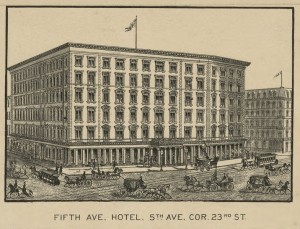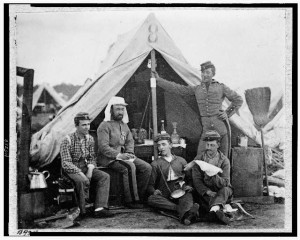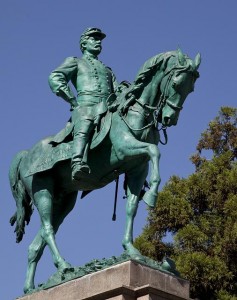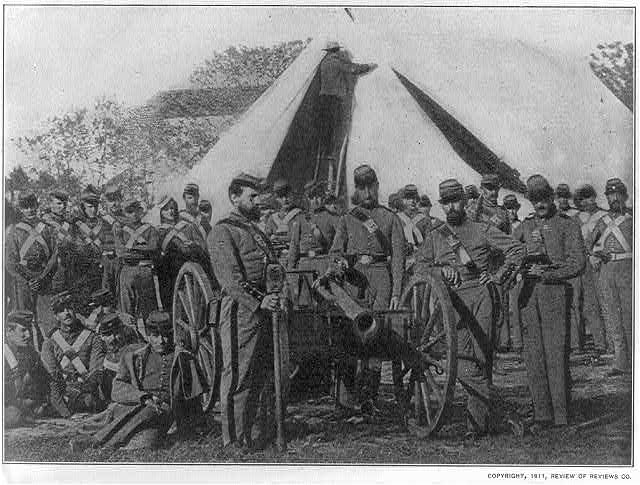150 years ago today recently ousted General George McClellan spoke to adoring crowds in New York City. Apparently he held off on dissing the Lincoln administration and seems to be genuinely appreciative of all New Yorkers had contributed to the war cause and the Army of the Potomac.
From The New-York Times November 21, 1862:
Gen. McClellan at the Fifth-avenue Hotel.; SERENADE BY THE YOUNG MEN’S DEMOCRACTIC ASSOCIATION–SPEECH OF THE GENERAL, ETC.
When it became generally known yesterday that Gen. McCLELLAN had left Trenton, in the State of New-Jersey, and had arrived at the Fifth-avenue Hotel, quite a number of his personal friends and admirers called to see him at his rooms. Many of them, however, were disappointed, for the General left the hotel at 10 A.M. and did not return until 2 P.M. The fact that he was not at his published headquarters, created some doubt as to whether he was really in the City, and, consequently, there were but few callers until evening, when, as had been publicly announced, he was to be serenaded by the Young Men’s Democratic Association. The time stated for the commencement of the serenade was 10 P.M., but as early as 9 o’clock there were several hundred people present. … He had gone out, so it was said, to visit some friends, and of course, was not in the hotel. Here was another disappointment; but as some members of the Seventh Regiment band appeared, it was taken for granted that the serenade would be given, and they all remained.
At 20 minutes of 11 o’clock the Young Men’s Democratic Association appeared in front of the hotel, with Capt. RYNDERS’ gun, and band and gun began to play. With them there came several hundred citizens, who enlivened the occasion by cheers for Gen. MCCLELLAN and reseated groans for Gen. FREMONT and Mr. GREELEY. There was a call for three cheers for Gen. BURNSIDE, which was responded to with one faint cheer, and a die-away.
At length the General appeared, accompanied by Mr. LUKE COZZENS, President of the Young Men’s Democratic Association, and the assemblage gave cheer after cheer, lasting for fully a minute. The President of the Association made several attempts to introduce the General, and was as often interrupted by cheers for the late Commander of the Army of the Potomac. Finally, he succeeded in introducing him, and when the renewed cheering had ceased, the General spoke as follows:
GEN. M’CLELLAN’S SPEECH.
MY FRIENDS: I thank you, cordially, for this spontaneous tribute of regard. I accept it not for myself, but for the Army of the Potomac, which I once commanded, [cheers,] and in which you are so deeply interested. Every battle, from Yorktown to Antietam, has added new proofs of the courage and devotion of the citizen soldiers of New-York, and has increased the debt of gratitude to them. No portion of the Republic has more liberally given its millions of money and thousands of men to the cause than this great Metropolis. At the commencement of the struggle no community was more prompt in responding to the appeal of the Government for aid. No community has a greater stake in the success of our cause than this-none more closely bound by the ties of kindred to the army with which I have been so long associated. I, therefore, and my former comrades with me, will feel doubly honored by the occasion this evening. And it is with a heart full to overflowing with gratitude, that I again thank you for your presence to-night. You know that I am still a soldier, and you will not expect a speech from me; and you will, therefore, allow me to bid you good night.
The General retired amid renewed cheering, and soon afterward all was quiet in front of the Fifth-avenue Hotel.
I’m not sure about his gun, but Isaiah Rynders was a Democrat and “political organizer for Tammany Hall”. He and his gang opposed abolitionists:
By the end of the decade, he was considered to be the de facto leader of the Five Points street gangs and was often requested by authorities to use his influence to cease rioting and gang-related violence which the police were unable to stop. He was a particularly important figure in civil disturbances against abolitionists during the period encountering such people as Frederick Douglass and Abby Gibbons. On one occasion, Wendell Phillips was stopped from speaking at the Broadway Tabernacle when Rynders publicly threatened that he and his men would “wreck the building and mob the audience”. Henry Ward Beecher invited Phillips to speak at Plymouth Church and, when a mob led by Rynders followed Phillips, he and his followers were met by a group of well-armed men who defended the building. It was during this meeting that Phillips not only spoke out against slavery but also of the corruption of Tammany Hall.
Harpweek discusses some of the activities of the Democratic Young Men’s Association, which:
organized rallies and meetings, where they denounced the war, emancipation, blacks, Lincoln, and the Republicans in terms of class and race warfare. They warned that the Lincoln “dictatorship” was undermining civil liberties, and that the freed slaves would move to New York to take the jobs of white working-class men and marry their daughters.
The Seventh Regiment band might be from the 7th New York Militia, which mustered in for several short stints from 1861 through 1863. A pre-war militia, the 7th was one of the first units to get to Washington, D.C. after Fort Sumter fell to the rebels.




